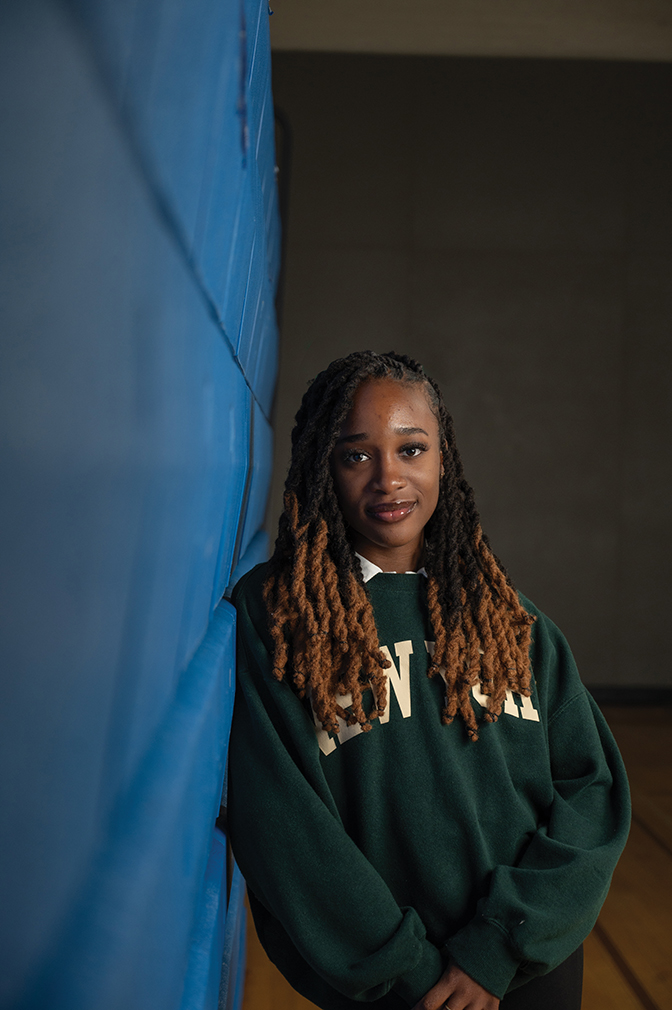Jaleesa ’26 knows the value of physical therapy firsthand. She’s from Jamaica, where she spent her time in high school running track. After beginning to experience shin splints, or pain caused by constant stress on the muscles, she was held back from performing at her best. A visit to a physical therapist changed her life.
“I went to sessions twice a week, surrounded by other athletes who faced similar challenges. Despite the setbacks, the resilience and the dedication our therapist showed us all kept everyone motivated. Those interactions inspired me—I saw firsthand how empathy and support could transform an athlete’s path to recovery.”
Before applying to Berea, she was considering another institution—Harvard—before choosing Berea’s no-tuition promise, where she’s now pursuing a health and human performance (HHP) degree. Jaleesa’s interest in the HHP major stemmed from her experience in dealing with her injuries as a student-athlete.
“Having to always visit my personal physical therapist led to me to love what she does for me, and I want to give that back to others.”
Physical therapists play an important role in the lives of not just athletes, but also everyday people. The top priority of a physical therapist, Jaleesa says, is improving the quality of life for their patients, especially after serious physical trauma. After an accident, Jaleesa explains, it can be difficult for those affected by injury to return to a normal life. Physical therapists help with recovery, especially making daily activities possible for their patients. This work is grounded in helping others and serving your community.

The major is comprised of courses across multiple fields of study, including anatomy and biology, focusing on studying the foundations of health science. The introductory courses to the major are rigorous, demanding and dense with information, and Jaleesa says they were easily the most difficult courses she’s had to take so far at Berea.
The rigor of these classes is worth it, though. When it comes to physical therapy and human anatomy, a mistake could make things worse before it gets better.
“You have to know what you’re talking about,” she warned.
The weight of these difficult courses is counterbalanced by passionate professors who expect the same amount of appreciation for the topic from students as they put in as teachers, Jaleesa says. The major also has a diverse and open path forward after graduation in terms of occupation. Jaleesa mentions that those majoring in HHP could pursue different occupations like personal training, physical education and coaching. The involved classes and flexible application of the resulting degree seem to be one of the primary strengths of this major.
After college, Jaleesa plans to attend graduate school. She believes her interests, abilities, and most importantly, personal experience, are best suited to study kinesiology and become a physical therapist, where she can help people directly.
I want to make an impact not only in sports but also by helping children and people dealing with physical trauma in their daily lives. I’m passionate about improving lives after unexpected challenges, and majoring in health and human performance is the foundation for making this goal a reality.
Jaleesa ’26
“I want to make an impact not only in sports but also by helping children and people dealing with physical trauma in their daily lives,” she said. “I’m passionate about improving lives after unexpected challenges, and majoring in health and human performance is the foundation for making this goal a reality.”
One of Berea’s Great Commitments is focused on service, specifically to Appalachia and the Berea community, but service can also take form wherever a Berea College graduate may find themselves. For Jaleesa, the most important part of being a physical therapist is to help patients return to something as close to normal as possible, in much the same way she was helped.


